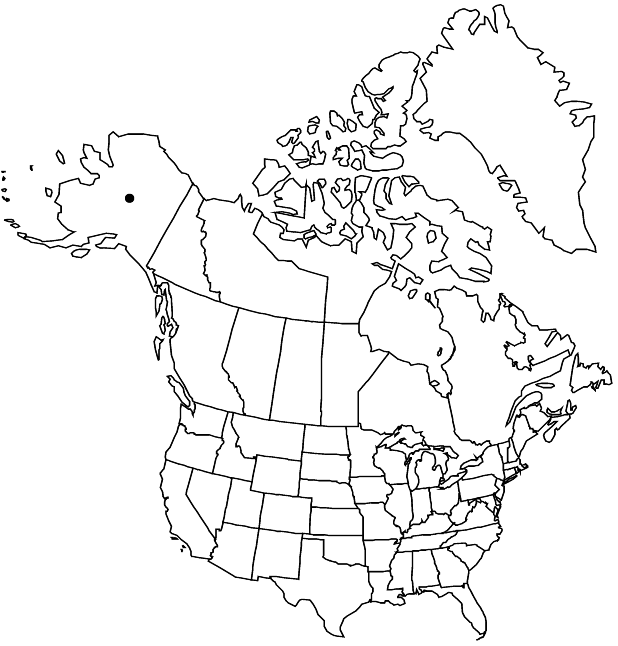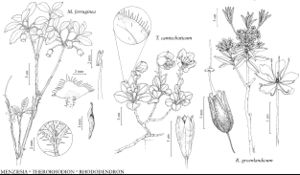Difference between revisions of "Therorhodion camtschaticum"
in N. L. Britton et al., N. Amer. Fl. 29: 45. 1914 ,.
FNA>Volume Importer |
imported>Volume Importer |
||
| (5 intermediate revisions by 2 users not shown) | |||
| Line 1: | Line 1: | ||
{{Treatment/ID | {{Treatment/ID | ||
|accepted_name=Therorhodion camtschaticum | |accepted_name=Therorhodion camtschaticum | ||
| − | |accepted_authority=(Pallas) Small | + | |accepted_authority=(Pallas) Small |
|publications={{Treatment/Publication | |publications={{Treatment/Publication | ||
|title=in N. L. Britton et al., N. Amer. Fl. | |title=in N. L. Britton et al., N. Amer. Fl. | ||
| Line 7: | Line 7: | ||
}} | }} | ||
|common_names=Kamchatka rhododendron | |common_names=Kamchatka rhododendron | ||
| − | |basionyms={{Treatment/ID/ | + | |basionyms={{Treatment/ID/Basionym |
|name=Rhododendron camtschaticum | |name=Rhododendron camtschaticum | ||
|authority=Pallas | |authority=Pallas | ||
| + | |rank=species | ||
| + | |publication_title=Fl. Ross. | ||
| + | |publication_place=1(1): 48, plate 33 [as kamtschaticum]. 1784 | ||
}} | }} | ||
|synonyms= | |synonyms= | ||
| Line 35: | Line 38: | ||
-->{{#Taxon: | -->{{#Taxon: | ||
name=Therorhodion camtschaticum | name=Therorhodion camtschaticum | ||
| − | + | |authority=(Pallas) Small | |
| − | |authority=(Pallas) Small | ||
|rank=species | |rank=species | ||
|parent rank=genus | |parent rank=genus | ||
| Line 50: | Line 52: | ||
|publication year= | |publication year= | ||
|special status= | |special status= | ||
| − | |source xml=https:// | + | |source xml=https://bitbucket.org/aafc-mbb/fna-data-curation/src/2e0870ddd59836b60bcf96646a41e87ea5a5943a/coarse_grained_fna_xml/V8/V8_894.xml |
|subfamily=Ericaceae subfam. Ericoideae | |subfamily=Ericaceae subfam. Ericoideae | ||
|genus=Therorhodion | |genus=Therorhodion | ||
Latest revision as of 22:47, 5 November 2020
Shrubs usually to 2 dm. Stems multicellular, eglandular-hairy (hairs unbranched), sometimes also stipitate-glandular-hairy, glabrate with age. Leaves often clustered toward distal portions of shoots; blade elliptic to obovate, 1–4.5(–6) × 0.7–2.4 cm, thin, margins ciliate (hairs eglandular), plane, apex rounded to obtuse or acute, mucronate, surfaces usually eglandular-hairy, sometimes sparsely glandular-hairy. Floral bud scales (and leaflike inflorescence bracts) eglandular-hairy, sometimes also stipitate-glandular-hairy. Inflorescences 2–3-flowered, sometimes flowers solitary; axis elongate. Pedicels 1–4.7 cm, eglandular- and/or stipitate-glandular-hairy; bracteoles 2, green, smaller than leaves. Flowers opening after shoot development, appearing to terminate leafy shoots due to their leaflike bracts; calyx lobes 8–21 mm, eglandular- and/or stipitate-glandular-hairy; corolla purple to, rarely, white, upper 3 lobes with darker spots, 19–32 mm, margins ciliolate, unicellular-hairy on outer surface, tube ± absent due to slit between lower 2 lobes, lobes 12–26 mm; stamens unicellular-hairy proximally. Capsules 6–11 mm, unicellular-hairy. 2n = 24, 26.
Phenology: Flowering summer.
Habitat: Arctic and alpine tundra and heathlands, meadows, and subalpine woods
Elevation: 0-1500 m
Distribution

Alaska, e Asia (Japan, Russian Far East).
Discussion
Therorhodion camtschaticum is found in the coastal and southern insular regions.
Selected References
None.
